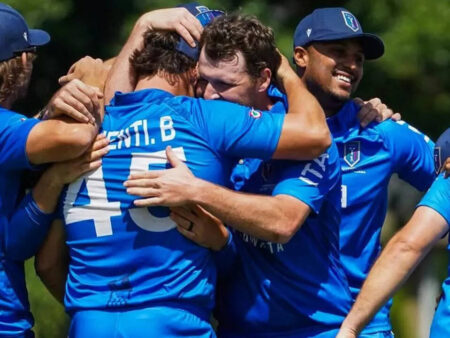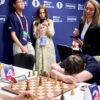SAN DIEGO – While every loss is unique, the feeling of defeat is universal, and sometimes it’s best to acknowledge the emotion.
“It’s okay to be disappointed,” US Women’s National Team coach Emma Hayes stated after experiencing her first defeat since taking charge last June, a 2-1 loss to Japan in the SheBelieves Cup final on Wednesday. “I told the players that.”
“It’s crucial to remember these moments and the lessons we learn from them. I’m looking forward to our next opportunity to build upon our progress and learn the most valuable lessons from playing against top-tier opponents. I prefer this learning experience to happen now rather than later.”
This type of game is typical in the USWNT’s four-year cycle. Consider the loss to France in a friendly before the 2015 World Cup, or the defeat to Mexico before the 2024 Olympics – both proved vital for the team’s major victories. This result isn’t a wake-up call, but rather an early step in a long-term plan and a formative moment for a new USWNT.
Hayes intended the SheBelieves Cup to be a testing ground for the next generation of players, and it certainly won’t be the last. She chose a squad primarily composed of players with 30 or fewer international appearances, aiming to provide valuable experience rather than relying on veterans as her predecessors might have. She considered this week’s games a success even before the Japan match and said “mission accomplished” after the final whistle, emphasizing the positives.
“Looking at Ally Sentnor’s progress, a young player joining the senior team, scoring a couple of goals, Lily Yohannes getting her first two senior starts,” Hayes noted. “There were many new combinations and connections, which present challenges against a polished team.”
Sentnor stood out during the SheBelieves Cup, scoring twice in three games, including the lone goal against Japan. She stepped up in the absence of Rodman, Swanson, and Wilson, strengthening her position early in the four-year cycle leading to the 2027 World Cup and 2028 Olympics.
“Ally has shown through youth national teams and her first year that she has game-deciding qualities,” Hayes said. “She capitalizes on minimal chances, a hallmark of top players. This tournament and consecutive starts will build her confidence.”
Hayes also identified areas for improvement that require experience. She mentioned 17-year-old Yohannes, with only four caps, facing Yui Hasegawa, a Japanese player with nearly 100 caps and “possibly the best pivot in the world.” This was just one takeaway.
“We need to improve ball retention because losing it leads to chasing the game. As a team, we handle pressure well, but breaking pressure needs development,” Hayes explained. “The players will learn why they can’t vacate central areas at crucial times. Experiencing this early is valuable.”
A typical reaction to defeat – alarm – was absent on Wednesday. Hayes views this not as a setback, but as part of growth, embracing the competitive reality of women’s soccer.
“Development isn’t linear,” she said. “It’s not always upwards. Moments like these show us where we are on our path. But I think it’s exciting, and our future is exciting, regardless of the result.”
What’s next
Hayes plans to utilize the long lead-up to the 2027 World Cup to develop the player pool. She’ll divide players into those ready for the senior team and those for the U-23 squad, a group she expects to be crucial for 2027 and 2028. The youth squad will frequently train alongside the senior team, similar to this year’s January camp.
“We must assess which players are ready now and later, who will join the U-23s and who will develop with us,” Hayes said. “We have thorough processes to remain objective. We take our time. Multiple people, including youth development head Tracey Kevins and the technical team, will determine the best progression for each player in the coming weeks.”
Hayes isn’t rushing player development, focusing on every aspect of a player’s transition to the senior team.
“It’s important to understand that adjusting to a new environment takes time,” she said, using goalkeeper Phallon Tullis-Joyce as an example. “This is only her second camp. She’s still getting to know everyone. Beyond playing ability, building off-field relationships takes time.”
The work continues in April when the USWNT plays Olympic silver medalist Brazil in two games, with more games to be scheduled.
“Now we move to the next step. The great thing is we have camps in April, May, and June, giving us time to further define our identity, which we eagerly anticipate,” Hayes concluded.











